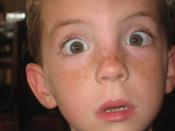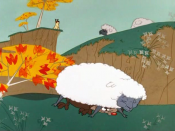In William Golding's 'Lord of the Flies', Ralph weeps not just for the death of Piggy, but for the loss of innocence of the boys as well. The lack of adult influence on the island leaves the boys' superegos venerable and the incantation of fear that manifests itself in the minds of the boys destroys them. The truth about human nature is revealed, as the boys separate from Ralph and the moral of civilization, and migrate to a world of killing, rebelling and destruction to seek sanctuary from the fear of the island. This causes them to perform terrible actions that cause the end of their innocence. At the end of the novel, Ralph then understands the enormity of the boys' actions, and weeps for the loss of their innocence.
The enticing prospect of the hunt causes Jack to quickly turn to the dark side of human nature.
Very quickly he beings to hunt, but he hunts, not just for the meat of the pig, but for feeding his primitive nature that has consumed him 'He tried to convey the compulsion to track down and kill that was swallowing him up..."I thought I might kill."' He originally is the only one that has this compulsion; the others are driven there by the prospect of the 'beastie', and the manifestation of the fear in their minds. Ralph not frightened, and neither is Jack, Piggy or Simon, as they all understand that the fear is irrational, '"The thing is - fear can't hurt you any more than a dream. There aren't any beasts to be afraid of...there is no animal."' The rest however, are unable to understand as they do, and fall victim to the fear, causing them to commit the acts that cause the end of their innocence.



Great essay
I have seen the movie but after reading your essay expressing the emotion behind the book I may have to read it.
3 out of 3 people found this comment useful.